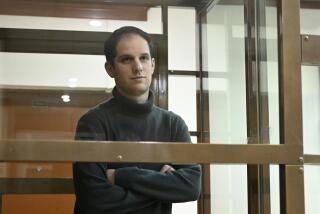Pravda Publishes Americans’ Views on U.S.-Soviet Ties
- Share via
MOSCOW — The Communist Party newspaper Pravda on Saturday published some of the letters that Soviet leader Mikhail S. Gorbachev had said during a television interview last week that he received from Americans as he prepared for his summit meeting in Washington with President Reagan.
Pravda allotted a full inside page to the letters under the headline: “With the Hope for Peace.”
Some excerpts from the letters, as reported by Pravda:
H. M. Howard of Corona del Mar, Calif.: “I believe the majority of Americans welcome the policy of glasnost (openness). Our two countries have so many differences that the disagreement can be overcome only in case there is an ardent striving on both sides to get to know each other better.
“(Gorbachev’s) visit can dispel mistrust between our countries. One would like the Soviet leader to meet ordinary Americans during his visit.”
David Yochelson, Los Angeles: “As I see it, today’s world lacks farsighted leaders, and the fact that such a leader as you has appeared, who can rise above day-to-day concerns for the good of the succeeding generations, holds out hope.
“It would be an honor for me if the program of the stay in the United States allowed you and your wife to have dinner either in my home in Los Angeles or in the home of my mother in Washington. Is it not the best way to get a better idea of the American people?”
Invited to Visit School
Liza Gribell, 18, Durham, N.C.: “In our class, we speak a lot about the (Soviet Union) and the glasnost program. I am very glad that our countries consider that peace between us is necessary.
“Our class shows strong interest in the Soviet Union and would be happy if you could come and get acquainted with a typical American secondary school.”
James K. Swiney, Washington: “We are looking forward eagerly to your visit to the United States, have high hopes for the conclusion of the long-awaited treaty and wish peace and friendship among countries to last at least 10,000 years.”
Phil Gotch, Lutheran pastor, Tremont, Minn.: “I would wish very much to invite the general secretary to visit us at our home. It may seem strange that a Christian pastor invites the general secretary, knowing in advance about his atheism.
“But this demonstrates exactly the fact that people can have varied views of life and at the same time be friends.”
Happy at Arms Pact
Kull Tarleton, Charlotte, N.C.: “All Americans are awaiting impatiently the Soviet leader’s visit to our country.
“What makes us happy most of all is that top-level talks will be held during this visit and that the result of these talks will be the conclusion of an important arms reduction agreement.
“Americans want peace as strongly as, I am sure, the Russian people want it.”
J. Myers, and others, Des Moines, Iowa: “We should aspire for deeper mutual understanding, pressing for such a situation when Americans and Soviet people could coexist without the threat of war.
“If the Soviet leader paid a visit to our city, this would have a profound positive impact on the frame of mind of all Americans.”
Doubts Could Be Eased
K. Kunen, Washington: “Surely, a certain skepticism exists in Soviet governing quarters and among the people as well as among Americans in carrying out openness and the drive for restructuring, and regarding to what extent this course is correct to the Soviet Union.
“We will hope that these doubts will be dispelled if the Soviet people, on the one hand, will be able to improve their political and economic system without altering the foundations of socialism and, on the other, will show the world that the United States and the (Soviet Union) can act as responsible powers helping to solve regional conflicts.”
In all, Pravda published about two dozen letters, many of which contained invitations from Americans for Gorbachev to visit them.
For instance, Paul Grafton, president of Consolidated Engineering Co. of Atlanta, suggested that Gorbachev visit that firm.
In Tulsa, Okla., Bryan Smith, a banker, urged the Soviet leader to join a breakfast meeting of local merchants and bankers.
Garry L. Scott, mayor of Moscow, Idaho, invited the Kremlin leader to visit his town, which he called “the largest Moscow outside the borders of the Soviet Union.”
In summarizing the letters, Pravda declared: “Their content shows that an American today is a man who is far from being indifferent about the state of affairs in the world, who thinks about his own life and the life of his children to be rid of the threat of a nuclear war.”
More to Read
Sign up for Essential California
The most important California stories and recommendations in your inbox every morning.
You may occasionally receive promotional content from the Los Angeles Times.










